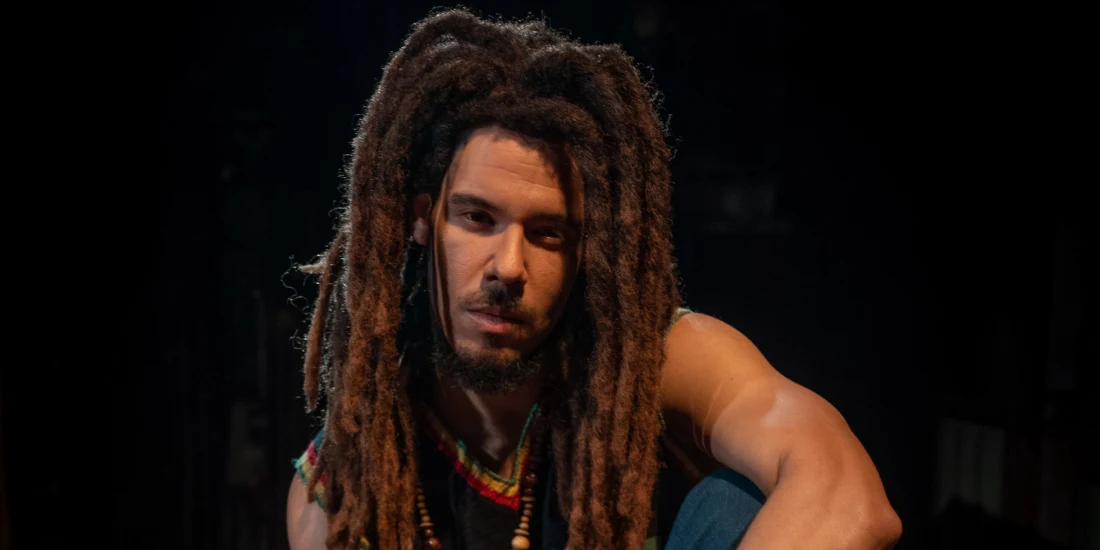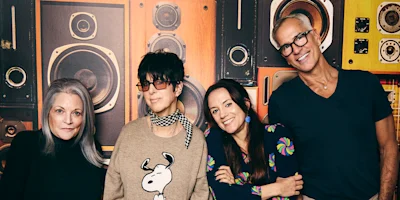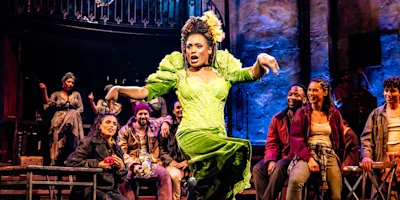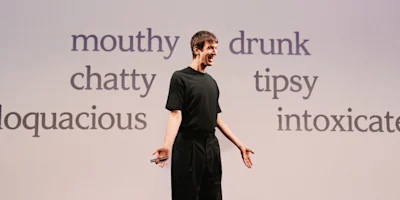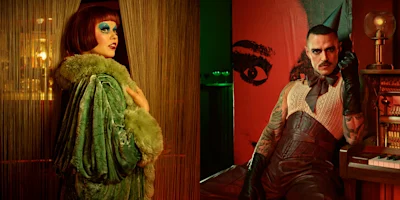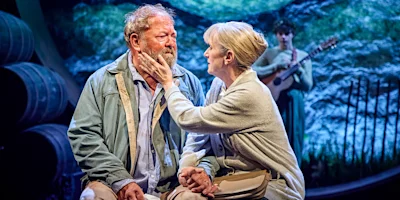
Bob Marley songs in ‘Get Up, Stand Up! The Bob Marley Story’
The West End is no stranger to jukebox musicals. Singing superstars often find their discography enjoys a second lease of life, including ABBA with Mamma Mia and Carole King with Beautiful: The Carole King Musical. In 2021, audiences can now listen to Bob Marley's hits, thanks to the world premiere of Get Up, Stand Up! The Bob Marley Story at the Lyric Theatre.
The Jamaican singer is considered to be one of the pioneers of reggae and ska, with Arinzé Kene originating the role of the legendary artist. Kene said it is "not only an honour to be able to spread Bob Marley's message further, but to get to be him for a little while is a lifelong dream come true."
We're taking a look back at Bob Marley's greatest hits of all time. You'll definitely be singing along to all these tunes.
Book Get Up, Stand Up! The Bob Marley Musical tickets on London Theatre.
Bob Marley songs in Get Up, Stand Up! The Bob Marley Story
"No Woman No Cry"
The seven-minute long reggae track is arguably one of Bob Marley's finest songs. Over time, the song's message has become confused; he's singing to a woman and telling her not to cry, instead of the idea being that you'll never cry if you never have a woman around. Lyrics reference his poor Jamaican upbringing, especially the cornmeal porridge. But, royalties from this song ensured a comfortable life for Marley and songwriter Vincent Ford, who ran a soup kitchen.
"Exodus"
Named after the second book in the Bible, "Exodus" adapts the story of Moses leading the Israelites out of Egypt to Rastafarians eventually discovering their own freedom. Recording "Exodus" proved a monumental struggle; Marley was only safe to record it due to fleeing Jamaica for England after an assassination attempt. However, this revolutionary track really did spread its intended message, widely played on Black radio stations across the United States and around the world.
"3 Little Birds"
Every little thing really is gonna be alright once you've listened to this genre-defining hit. The three little birds are said to represent I Threes, a trio of female backing vocalists for Bob Marley and the Wailers whenever they performed live. "3 Little Birds" has been covered by numerous artists over the year, including Robbie Williams, Jason Mraz and Billy Ocean. There's even an Alvin & The Chipmunks version too. But, there's nothing quite like the original.
"Get Up Stand Up"
While touring Haiti, Marley felt compelled to write "Get Up Stand Up". He was shocked at the daily lives of Haitians, deeply affected by the growing levels of poverty in the Caribbean country. He'd often perform it on tour, usually as the last song, which really roused up the audiences. It's now become an anthem for charity initiatives, sung at Amnesty International concerts and in support of protesters worldwide.
"Is This Love"
Released in 1978, "Is This Love" is a soulful, free-spirited song that became one of Marley's greatest hits. British fans clearly couldn't get enough either, as the song entered the UK top ten in the 1978 music charts. A new generation is growing up with this track, thanks to a Dutch remix by LVNDSCAPE and Leon Bolier, released in 2016.
"Could You Be Loved"
This track is an example of a musical experiment that's definitely gone right! Written while travelling on an aeroplane after live performances in Brazil, there's so much to enjoy in this song: the kicking bass line, the reggae/disco vibes and the catchy lyrics. You can even hear the Brazillian influence too, courtesy of a Brazilian cuíca that's typically heard at carnivals.
"Jamming"
In Jamaican patois, "jamming" refers to a celebratory event, where friends and family come together and spend valuable time with each other. That's what Marley was insinuating in "Jamming", especially when he refers to the bullets fired at him in late 1976. In this song, you can really feel just how important music is to Bob Marley and The Wailers, both as a source of comfort and creative expression.
"Buffalo Soldier"
In the nineteenth-century American Indian Wars, regiments of Black soldiers fought on behalf of the United States army, nicknamed "Buffalo Soldiers" by the Native Americans. These fighters were honored for their bravery and fight for survival in Bob Marley's 1983 song, released posthumously. In fact, "Buffalo Soldier" is the lead track on "Confrontation", an album which encouraged its listeners to rise up.
"Sun Is Shining"
You may have heard popular remixes of "Sun Is Shining" that put reggae fusion on the map, but did you know the original was released nearly 50 years ago? Bob Marley rarely performed this song live, but its message is simple to understand; when the weather is good, you'll feel happy too. It's reported that Marley once added it into a concert because the rain stopped. Imagine picking your setlist that spontaneously!
"I Shot The Sheriff"
Bob Marley was not afraid to express his political views through song. His 1973 track "I Shot The Sheriff" does this perfectly, with Marley consciously choosing the word "Sheriff" instead of police to promote injustices in Jamaican society and further afield. The song clearly influenced contemporary artists, with Eric Clapton releasing a cover version just one year later.
Is there a Bob Marley musical album?
The Bob Marley musical will be available to listen to in album form. The Get Up, Stand Up! The Bob Marley Musical album will be released on 10 October 2022.
Originally published on
